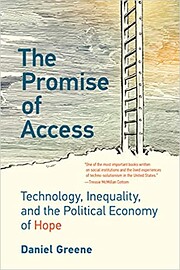

Cliquer sur une vignette pour aller sur Google Books.
|
Chargement... The Promise of Access: Technology, Inequality, and the Political Economy of Hopepar Daniel Greene
 Aucun Actuellement, il n'y a pas de discussions au sujet de ce livre. aucune critique | ajouter une critique
"Based on fieldwork at three distinct sites in Washington, DC, this book finds that the persistent problem of poverty is often framed as a problem of technology"-- Aucune description trouvée dans une bibliothèque |
Discussion en coursAucun
 Google Books — Chargement... Google Books — Chargement...GenresClassification décimale de Melvil (CDD)303.48Social sciences Social Sciences; Sociology and anthropology Social Processes Social change Causes of changeClassification de la Bibliothèque du CongrèsÉvaluationMoyenne: (4.75) (4.75)
Est-ce vous ?Devenez un(e) auteur LibraryThing. |
||||||||||||||||||||||||||||||||||||||||||||||||||||||||||||||||||||||||||||||||||||||||||||||||||||||||||||||||||||||||
There’s a great example of the conflicts here where the official ideology was that using the computers for porn was “doing the library wrong,” as opposed to submitting job applications. But it was also “clear that porn was a positive example of the sort of service librarians believed they should provide: giving people the space and the materials they could not get elsewhere.” So the librarians felt conflicted because the institution was supposed to be, but also could not be, both “a public service library that welcomed all comers and a bootstrapping library that trained digital professionals.” He tells similar stories about teachers at charter schools who struggled with students’ use of technology in unapproved ways; if the students didn’t perform, the school might not survive, not to mention that the consequences for students of not getting an educational credential could be dire, so the administration shifted to more test-driven and directive measures over time despite their ideological resistance to punishment. Ultimately, “places like schools and libraries cannot help but fail in their duties, but, “because those duties are so important to their survival and that of the people they serve, they will inevitably keep trying. Even if the people served are further marginalized in the process.” (